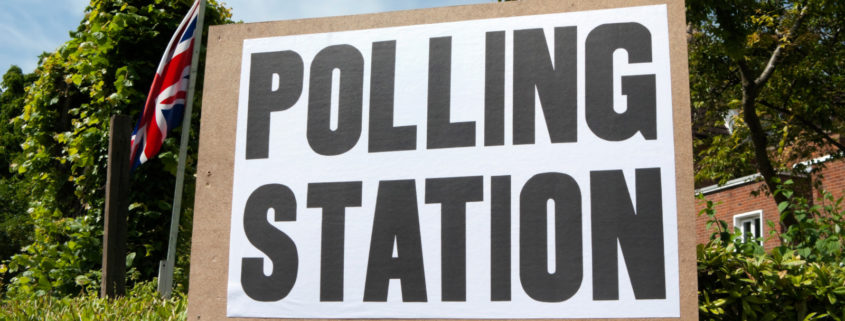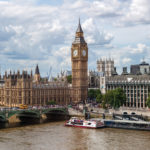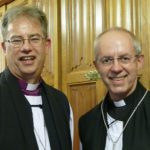“God is our refuge and strength
A very present help in trouble.
Therefore we should not fear, though the earth should change
Though the mountains shake in the heart of the sea”
Psalm 46 has a special resonance today… The United Kingdom has voted to leave the European Union. This will be good news for some people but a genuine disappointment to others. The coming years will be marked by uncertainty and change. What does it mean and how should we respond?
A clear outcome
The outcome of the Referendum is clear. 52% of the electorate has voted to leave, 48% to remain. Every English region outside London had a majority to leave.
The vote in the city of Sheffield was close but still 51% in favour. The vote across the rest of the Diocese of Sheffield was even clearer (Doncaster 69% leave; Rotherham 67%; Barnsley 68%; East Riding 60%).
It is a more mixed picture in the Diocese of Oxford (where I become the bishop in a few weeks time). Some local authority areas have clearly voted to remain, others to leave but the balance in the region is still for leaving.
How should we interpret the result?
I watched the television coverage up until 1.30 am and again from 5.30. The politicians were interpreting the outcome in different ways: as a protest against particular parties or politicians, as a comment on the state of the NHS or immigration.
I’m cautious about all of these interpretations. I may be wrong but I believe that such a large number of people voted Leave for two reasons. First they genuinely want Britain to leave the European Union and to assert the right to self determination. 52% of the population in effect set the right to self governance above short and medium term economic prosperity.
Second 52% of the population voted for fundamental change in our country going forward even if that change brings some instability. Those left behind by current economic policies and politics clearly believe they have most to gain from new beginnings. That should tell us something very important.
The ongoing debate
Three vital questions came into focus during the long campaign. The result did not resolve them. We need more reflection and public debate on each.
The first is global migration. We heard again and again that “immigration” was an issue. But for the most part, the campaign was framed in the language the 1970’s and 1980’s. The issue for 2016 is not simply immigration but global migration. We are living through and will live through the greatest migration of people in human history. This movement of peoples is likely to increase through the effects of climate change, population growth, global inequality and armed conflict. We need a comprehensive, deep conversation about how Britain and the world will respond.
The second is identity. What does it mean to be British in 2016? We need leaders of vision able to articulate an inspiring vision for Britain and its future. That positive vision did not emerge in the campaign from either side.
The third is a new kind of politics. The murder of Jo Cox MP was an immense tragedy. The response of politicians on all sides helped us see again how many good, honest people represent us in Parliament. We need a style of public discourse which is more honest, more humble, more gentle and more kind. This will take more than self-discipline on the part of those in public life. We need some new symbolism. Over the next ten years, the House of Parliament are to be refurbished. Will we have the courage, I wonder, to reshape the chamber of the House of Commons to be less adversarial, less binary, more collaborative, seeking wisdom from every part of the community?
How should the Church respond?
The Archbishops of Canterbury and York have issued a statement this morning calling for humility and courage. They say “Unity, hope and gentleness will enable us to overcome the period of transition that will now happen and emerge confident and successful”.
The Church will respond with prayer for our government and Parliament and for all sections of our society. We will respond by entering into hopeful dialogue with people on all sides of the debate with courtesy and kindness. We will respond by cherishing the poor and the vulnerable and renewing our efforts to build a safe, just and peaceful world. We will continue to welcome the stranger and show mercy to the needy here and around the world. We will continue to build bridges and bonds of friendship across Europe and across the whole world.
In the words of Psalm 46, we will not be afraid though our world may be shaken. We will take time today to pray, to think, to love and to speak gently in God’s name.
+Steven




I live in Gibraltar and for us, due to Spanish threats, the future is even more uncertain. Our vote was 95% to remain. However with faith in Christ we will come through all the uncertainty.
My wife commented on hearing the news early on Friday morning which came as something of a shock, “this is like the peasants revolt.” I think that was a shrewd comment and now is the time for deep listening and reflection rather than angry protest!
Britain is doomed as long as the Conservatives are in power. Austerity and sanctions are cleansing our cities of the poor and vulnerable. We are turning our backs on our friends. The grief would not have been heartfelt if many Conservative MP had been killed. Britain needs resurrection, something the church no longer believes in.
Ruth many European countries are more Christian than Britain… Italy, Greece, Cyprus and Spain for just four examples. But looking at it from the other side, I was in Greece when the result was announced, and it didn’t really cause a ripple. I did, however, get the feeling that they would be happy to see the end of the alcohol bender Brits who rampage their resorts and the football thugs who masquerade as England fans.
I voted to leave for no other reason than that of freedom; if it is good for the other peoples of the world to be granted ‘UHURU’ or what title you want to give it, then we too are entitled to that. Thank you, Bishop, for giving us the credit of our convictions.
I was heartbroken to hear the news of the Brexit vote: if we stick by it, it’s absolutely clear that Scotland will go for independence and Ireland could well flare up in anger: so congratulations UKIP -you’ve seized independence and lost the United Kingdom! The Leave vote was based on: 1. Lies, or at least misrepresentation, of which the worst was claiming a figure for the ‘cost of EU membership’, which excluded our rebate and the grants we receive. 2. Self-delusion, that somehow we could ‘go back to the 60s’ of full employment and a less divided society -worth restoring,… Read more »
A breath of fresh air..
I, and many others I’m sure, voted ‘Leave’ from a feeling deep in my soul. I left church last Sunday thinking for the good of His world, does God want us to be part of a U.S.E.? I believe that some of the people we have to thank for helping us make our big Brexit decision are (In no particular order): Sir John Major, Gordon Brown, Ruth Davidson, Jeremy Corbyn, Nicola Sturgeon, Rt Hon George Osborne,Tony Blair, President Obama, the Archbishops of Canterbury and York, David Beckham, Jean-Claude Juncker, Sadiq Khan, Angela Merkel, Christine Lagarde, Francois Hollande, David Cameron… It… Read more »
Maybe we should see this as a wonderful opportunity to unite in prayer that the nation may again come under the sovereignty of the Lord or God , to repent and return to dependance on The Lord who in His mercy has freed us from a none Christian, legalistic organisation, to become a Christian country again not just in name but in reality.
Your talk about what 52 per cent of the population wanted. But this isn’t right. Young people aged under 18 didn’t get the opportunity to vote for what they wanted. Even saying 52 per cent of the electorate voted to leave is not correct. 28 per cent of the electorate didn’t vote. The vote to leave was made by about 37 per cent of the electorate. A significant minority yes but not the views of the majority of even most people.
You seem to ignore the 48% who voted to stay in the European Union. Decisions to make radical changes in the church’s synod require a two thirds majority. It seems strange that such a momentous decision can be made on a referendum which is just a snap shot of opinion at a given time. People, including the Sun columnist Kelvin Mackenzie have said that they now regret voting the way they did. 52% is not really a conclusive majority when the turnout was less than 75%.
I feel a prayer I read some years ago is appropriate now however we voted. ‘Grant us, O Lord, leaders through whom it is to your glory that they lead us.’
Sadly I think that a great many people voted leave because they believe that the EU operates a racist migration policy which favours white Europeans over members of the Commonwealth whose ancestors fought for the UK in two World (but maily European generated) Wars.